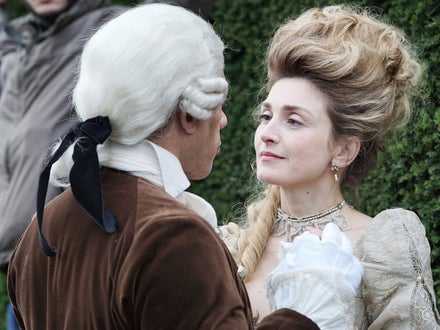Julie Gayet in 'Dix pour cent': Francois Hollande’s girlfriend sends herself up in French 'Extras'-style sitcom

Your support helps us to tell the story
From reproductive rights to climate change to Big Tech, The Independent is on the ground when the story is developing. Whether it's investigating the financials of Elon Musk's pro-Trump PAC or producing our latest documentary, 'The A Word', which shines a light on the American women fighting for reproductive rights, we know how important it is to parse out the facts from the messaging.
At such a critical moment in US history, we need reporters on the ground. Your donation allows us to keep sending journalists to speak to both sides of the story.
The Independent is trusted by Americans across the entire political spectrum. And unlike many other quality news outlets, we choose not to lock Americans out of our reporting and analysis with paywalls. We believe quality journalism should be available to everyone, paid for by those who can afford it.
Your support makes all the difference.You often used to know what to expect from French-made programmes in the country’s television schedules: dreary detective series, formulaic comedies and sentimental drama.
Not any more. A renaissance in the quality of prime-time French television was confirmed this week by an edgy sitcom, in which cinema celebrities play and mock themselves. Actors who have agreed to appear in the series include Julie Gayet, the girlfriend of President François Hollande.
Ms Gayet plays an actress called Julie Gayet, who has to film love scenes in 18th-century costume with an actor whom she detests.
In a preview released this week, she is seen entering a reluctant embrace with her “co-star” – the French rapper turned actor, Joey Starr. He whispers to her: “Do you have a boyfriend at the moment?”
Other big-screen celebrities who appear in the series include the Belgian actress Cécile de France, Nathalie Baye, Gilles Lellouche and the veteran actress, Line Renaud. More than 20 celebrities declined to take part.
Dix pour cent (“10 per cent”) – which owes something to the Ricky Gervais sitcom Extras – is set in a Parisian theatrical agency. Its overall director is Cédric Klapisch, a maker of comic films for the big screen, including the L’auberge Espagnole trilogy starring Cécile de France and Audrey Tautou.
For decades, an audio-visual paradox persisted in France. The French cinema industry was creative and successful; the television industry – which helped to subsidise cinema – was dull and unadventurous.
The series Dix pour cent, to be sold worldwide with the title Call My Agent, is a first example of big French cinema names following the trend in the US and migrating to television. There has already been a huge improvement in French TV drama in recent years, including the detective series L’Engrenage (“Spiral”), which has a big following in Britain, and a drama series about war-time France, called Un Village Français.
Klapisch said: “It’s great that the frontiers between cinema and television have exploded… The fact that Kevin Spacey starred in House of Cards encouraged French artists to cross the line without fear of being re-categorised as a ‘telly actor’. Cinema, television, commercial, theatre… the public no longer makes any distinction.”
In the first episode of Dix pour cent, shown on France 2 this week, Cécile de France, 40, played a 40-year-old actress also called Cécile de France who must face the fact that she can no longer play a young woman. Her favourite agent tries to mislead her. “You must never lie to an actress,” he says. “Just don’t tell them the truth.” Another agent tempts her to undergo cosmetic injections to win a role in a Quentin Tarantino movie, but she finally accepts her fate – and her face.
Many French actors, including Sophie Marceau, refused to appear in the series because they did not want to make fun of themselves. Cécile de France says that this is what attracted her to take part. “I wanted it to be really comical, with scenes in which I am truly ridiculous,” she told Le Parisien newspaper. “What’s funny about this series is that it allows you to mock the (celebrity) world which is always presented so glossily.”
Klapisch said: “Lots of actors said ‘no’. They didn’t want to believe that the fictionalised actor in the show could in any way be seen as them. You have to have a spirit of self-mockery, which is common in Britain and in the United States but not in France. Those actors who did accept – Julie Gayet for example – really went for it. God knows she is in a tricky position at present [as the President’s girlfriend] but she played the game to the hilt.”
The series, judging by the first two episodes, captures perfectly the brittle bitchiness of the Parisian cinema world. It was devised and written by Dominique Besnehard, who used to be an agent to the stars himself. “We had to filter things a little. The reality is much worse,” said Klapisch.
Join our commenting forum
Join thought-provoking conversations, follow other Independent readers and see their replies
Comments